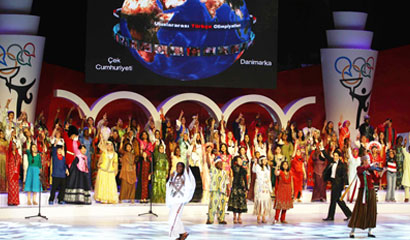Is it Just A Language Contest?
 You must have realized that another season of the Turkish Language Olympiads has arrived, as they are getting some media attention, though they deserve more.
You must have realized that another season of the Turkish Language Olympiads has arrived, as they are getting some media attention, though they deserve more.
This year's contest is the seventh edition of the Olympiads, and 700 students from 115 countries are attending the finals. Of course, we take pride in such a popular event having our mother tongue at its heart. Many of us do things that may seem strange to onlookers, such as crying while watching kolbasti. We are going through a period of time when we become more sentimental and enthusiastic. Those who are "wowed" by the Olympiads, as well as those who have spent years in foreign countries to make them possible, are well justified in feeling proud. However, we will be held responsible if we fail to say this: It would be a waste if we spent our time living only under the rain of sentiments or enthusiasm or listening to lyrics of self-heroism. The part covered by the media, therefore, that is visible to us, is only tip of the iceberg. We must concentrate on the larger portion inside the water.
The Turkish Language Olympiads are not merely a language contest; they are also a model of communication. Every year, around this time, a market is set where students of Turkish and teachers can make their annual exchange. Everyone is bringing the products they produced for the year to this market. A teacher in Kenya has things to ask from the teacher working in Siberia. Teachers in Europe have things to explain. Those coming from the Far East have stories to tell. More importantly, a child from Mozambique has greetings to extend to his friend from the Netherlands. The air of Tibet will be exchanged with the heat of Africa. The children raised in the monsoon rains will be entrusted to the cool winds of northern Europe. Danish Anna will become acquainted with Nigerian Ahmad. Every one of them will return to their homeland with a new world vision in their minds. They will take hope back to their countries at a time when pessimism is dominant. This trade of goodness and hope is a unique contract: The revenue obtained will belong to every one of those involved without any decrease. Each will have not only the illumination afforded only by his own candle, but also the brightness from thousands of other candles. Perhaps they will not realize that they are laying the foundations of the island of peace.
For these children, Turkish is not only a language, but also a lifestyle. Most importantly, it is a lifestyle that is collectively built and to which they all contribute. Teachers kick off the process, and collective efforts for rebuilding accumulate. Actually, it is from here that it derives its strength. They are learning not a language imposed by an occupying force, but the language of their sincere and self-sacrificing friends who work dutifully to spread the message of love to every part of the world. Then they realize that this language they learn has earned them thousands of new friends of diverse colors and ethnicities. They are not aware of the processes these friends, like themselves, have gone through, but, thanks to these Olympiads, they can establish personal connections and friendships. They realize the horizons the Turkish language opens for them. It is particularly important that students attend the event in their local attire. This is a remarkable phenomenon with respect to communication, in addition to creating a warm and colorful atmosphere. It is a sign of accepting everyone with their own values and beliefs. A common ground is being established where diverse peoples can live together and pluralism is not undermined.
A person whose name I cannot remember ― if I'm not wrong it was a Russian intellectual ― summarized this movement as follows: "Mevlana Jelaluddin Rumi had said, 'Come whoever you are.' But Fethullah Gülen says, 'I will come whoever you are.'" One can write many articles on this observation. One of the most important achievements of the Olympiads is that they convince everyone to go to everyone. Actually, it is easy to say, “come." It is harder and more precious to be able to say, “I will come." We offer our gratitude to everyone who has labored in this picture of happiness, particularly the self-sacrificing teachers who are becoming more heroic each day.
- Created on .